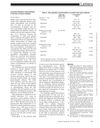 40 citations,
May 2020 in “Cureus”
40 citations,
May 2020 in “Cureus” The conclusion is that treatments for Telogen Effluvium exist, but standard treatment guidelines are needed.
 23 citations,
December 2012 in “ChemistryOpen”
23 citations,
December 2012 in “ChemistryOpen” Probe detects finasteride with high selectivity and low detection limit.
 14 citations,
January 2018 in “Endocrinology and Metabolism”
14 citations,
January 2018 in “Endocrinology and Metabolism” Many infertile women with PCOS in Central Vietnam have metabolic or insulin resistance syndrome, with obesity and older age increasing the risk.
 4 citations,
December 2012 in “Arquivos Brasileiros De Endocrinologia E Metabologia”
4 citations,
December 2012 in “Arquivos Brasileiros De Endocrinologia E Metabologia” A postmenopausal woman's masculine symptoms improved after surgery for a hormone-producing ovarian tumor.
 6 citations,
April 2016 in “Journal of the Formosan Medical Association”
6 citations,
April 2016 in “Journal of the Formosan Medical Association” Metformin improved insulin resistance and BMI in overweight Taiwanese women with PCOS, and a 2-hour insulin test may be a good screening tool.
 10 citations,
August 2012 in “Clinical Pharmacokinectics”
10 citations,
August 2012 in “Clinical Pharmacokinectics” Type 2 diabetes does not change how metformin works in obese pregnant women, so dosage adjustments are not needed.
 25 citations,
June 2017 in “Scientific reports”
25 citations,
June 2017 in “Scientific reports” Stress worsens Tourette symptoms by increasing allopregnanolone levels.
 23 citations,
September 2021 in “Frontiers in Cellular and Infection Microbiology”
23 citations,
September 2021 in “Frontiers in Cellular and Infection Microbiology” Testosterone's effects on COVID-19 are unclear and need more research.
 14 citations,
January 2001 in “Clinical chemistry”
14 citations,
January 2001 in “Clinical chemistry” Hair can be used to measure cancer-related chemicals noninvasively.
 30 citations,
January 2016 in “Journal of Pharmaceutical and Biomedical Analysis”
30 citations,
January 2016 in “Journal of Pharmaceutical and Biomedical Analysis” The research found different metabolism changes in PCOS patients and suggested new potential markers for diagnosing PCOS with or without insulin resistance.
 50 citations,
January 2016 in “The Journal of Clinical Endocrinology and Metabolism”
50 citations,
January 2016 in “The Journal of Clinical Endocrinology and Metabolism” Certain microRNAs in the fluid around eggs are linked to Polycystic Ovary Syndrome and may help diagnose it.
 3 citations,
January 2023 in “International Journal of Molecular Sciences”
3 citations,
January 2023 in “International Journal of Molecular Sciences” Heat Shock Proteins are important in the development of Polycystic Ovarian Syndrome and could be targets for new treatments.
 59 citations,
November 2018 in “Psychoneuroendocrinology”
59 citations,
November 2018 in “Psychoneuroendocrinology” Lower levels of certain brain chemicals are linked to worse PTSD symptoms in men.
 September 2023 in “Journal of movement disorders”
September 2023 in “Journal of movement disorders” Dopaminergic therapy in Parkinson's disease patients is linked to increased hair loss.
 8 citations,
December 2022 in “Nature Reviews Endocrinology”
8 citations,
December 2022 in “Nature Reviews Endocrinology” Sex hormones' effects on COVID-19 are unclear and more research is needed to understand their potential as treatment.
7 citations,
April 2022 in “Journal of pharmaceutical and biomedical analysis” The method can measure multiple steroids in human hair to study long-term steroid metabolism, especially in newborns and children.
 8 citations,
November 2012 in “Journal of Endocrinological Investigation”
8 citations,
November 2012 in “Journal of Endocrinological Investigation” Greek women with classic PCOS are more likely to have metabolic syndrome and insulin resistance than those with newer PCOS types.
 17 citations,
February 2019 in “Journal of steroid biochemistry and molecular biology/The Journal of steroid biochemistry and molecular biology”
17 citations,
February 2019 in “Journal of steroid biochemistry and molecular biology/The Journal of steroid biochemistry and molecular biology” AKR1D1 controls glucocorticoid levels and receptor activity in liver cells.
 7 citations,
January 2018 in “Reproduction”
7 citations,
January 2018 in “Reproduction” Inhibiting 5α-reductase increases progesterone levels in late pregnant mares.
 5 citations,
January 2016 in “Asian pacific Journal of Tropical Biomedicine”
5 citations,
January 2016 in “Asian pacific Journal of Tropical Biomedicine” Phthirusa pyrifolia extract may lower testosterone and harm male rat reproduction without damaging the liver or kidneys.
2 citations,
April 2021 in “PLoS ONE” Rural Bangladeshi girls mature later than peers in other low and middle-income countries due to poor nutrition and socioeconomic conditions.
 28 citations,
May 2018 in “Scientific reports”
28 citations,
May 2018 in “Scientific reports” Exercise improves insulin sensitivity and hormone regulation in PCOS rats.
2 citations,
August 2021 in “Experimental and Therapeutic Medicine” Moxibustion may help improve ovarian function by changing androgen levels.
 4 citations,
May 2019 in “Physiology & Behavior”
4 citations,
May 2019 in “Physiology & Behavior” Cocaine impairs male sexual behavior and alters testosterone metabolism in the brain.
 March 2023 in “East African scholars journal of medical sciences”
March 2023 in “East African scholars journal of medical sciences” Metformin may help regulate periods and cause modest weight loss in PCOS patients, but more research is needed.
 34 citations,
February 2016 in “Fertility and Sterility”
34 citations,
February 2016 in “Fertility and Sterility” More PDCD4 is linked to obesity, insulin problems, and cell death in ovaries for those with polycystic ovary syndrome.
 1 citations,
October 2022 in “Journal of food and nutrition research”
1 citations,
October 2022 in “Journal of food and nutrition research” Cinnamon may help manage obesity and improve conditions related to Polycystic Ovary Syndrome (PCOS).
 January 2022 in “Journal of family medicine”
January 2022 in “Journal of family medicine” Polycystic Ovarian Syndrome (PCOS) can cause chronic inflammation, mental health issues, and changes in gut bacteria, but a holistic lifestyle change can significantly improve these conditions.
46 citations,
April 1982 in “Journal of the American Academy of Dermatology” Isotretinoin shrinks sebaceous glands without affecting hair or skin color, unlike etretinate.
 January 2024 in “Journal of surgical case reports”
January 2024 in “Journal of surgical case reports” Removing an adrenal tumor can significantly reduce high androgen levels in postmenopausal women.


























